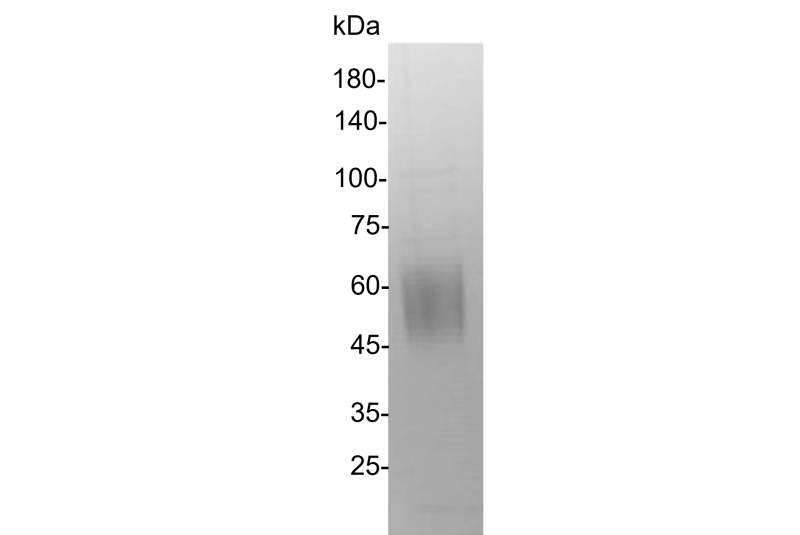Human CD28 ECD, His-SUMO Tag, HEK293
- Enhances the activation of T cells, resulting in a stronger immune response.
- Facilitates the proliferation of T cells, contributing to the growth of the immune cell population.
- Contributes to the production of cytokines, crucial for cell signaling and immune regulation.
Sequence
NKILVKQSPMLVAYDNAVNLSCKYSYNLFSREFRASLHKGLDSAVEVCVVYGNYSQQLQVYSKTGFNCDGKLGNESVTFYLQNLYVNQTDIYFCKIEVMYP
PPYLDNEKSNGTIIHVKGKHLCPSPLFPGPSKP with polyhistidine-SUMO tag at the N-terminus
UnitProt ID:
P10747
Source
Escherichia coli
Endotoxin Test
<0.1 EU per 1 μg of the protein by the LAL method.
Purity:
>95% as determined by SDS-PAGE.
Form:
Lyophilized
Storage Buffer:
Lyophilized from a 0.2 μm filtered solution of PBS, pH 7.4.
Reconstitution:
It is recommended to reconstitute the lyophilized protein in sterile H₂O to a concentration not less than 200 μg/mL and incubate the stock solution for at least 20 min to ensure sufficient re-dissolved.
Stability & Storage:
This product is stable after storage at:
• -20°C for 12 months in lyophilized state from date of receipt.
• -20°C or -80°C for 1 month under sterile conditions after reconstitution.
Avoid repeated freeze/thaw cycles.
Shipping Conditions:
Blue ice
Alternate Names:
Tp44, CD28 molecule, T-cell-specific surface glycoprotein CD28
NKILVKQSPMLVAYDNAVNLSCKYSYNLFSREFRASLHKGLDSAVEVCVVYGNYSQQLQVYSKTGFNCDGKLGNESVTFYLQNLYVNQTDIYFCKIEVMYP
PPYLDNEKSNGTIIHVKGKHLCPSPLFPGPSKP with polyhistidine-SUMO tag at the N-terminus
UnitProt ID:
P10747
Source
Escherichia coli
Endotoxin Test
<0.1 EU per 1 μg of the protein by the LAL method.
Purity:
>95% as determined by SDS-PAGE.
Form:
Lyophilized
Storage Buffer:
Lyophilized from a 0.2 μm filtered solution of PBS, pH 7.4.
Reconstitution:
It is recommended to reconstitute the lyophilized protein in sterile H₂O to a concentration not less than 200 μg/mL and incubate the stock solution for at least 20 min to ensure sufficient re-dissolved.
Stability & Storage:
This product is stable after storage at:
• -20°C for 12 months in lyophilized state from date of receipt.
• -20°C or -80°C for 1 month under sterile conditions after reconstitution.
Avoid repeated freeze/thaw cycles.
Shipping Conditions:
Blue ice
Alternate Names:
Tp44, CD28 molecule, T-cell-specific surface glycoprotein CD28
Background Information
The full name of CD28 is Cluster of Differentiation 28.
CD28 is a glycoprotein belonging to the immunoglobulin superfamily, found on the surface of T cells. It plays a crucial role in T-cell activation, proliferation, cytokine production, and survival. CD28 binds to ligands B7-1 and B7-2, contributing to the T and B cell response pathways. CD28's structural features include an extracellular domain, a transmembrane domain, and an intracellular domain. It is expressed as disulfide-linked homodimers or monomers on murine T cells and developing thymocytes. B7/CD28 family members are involved in regulating T-cell tolerance and can modulate T-cell receptor signaling.

